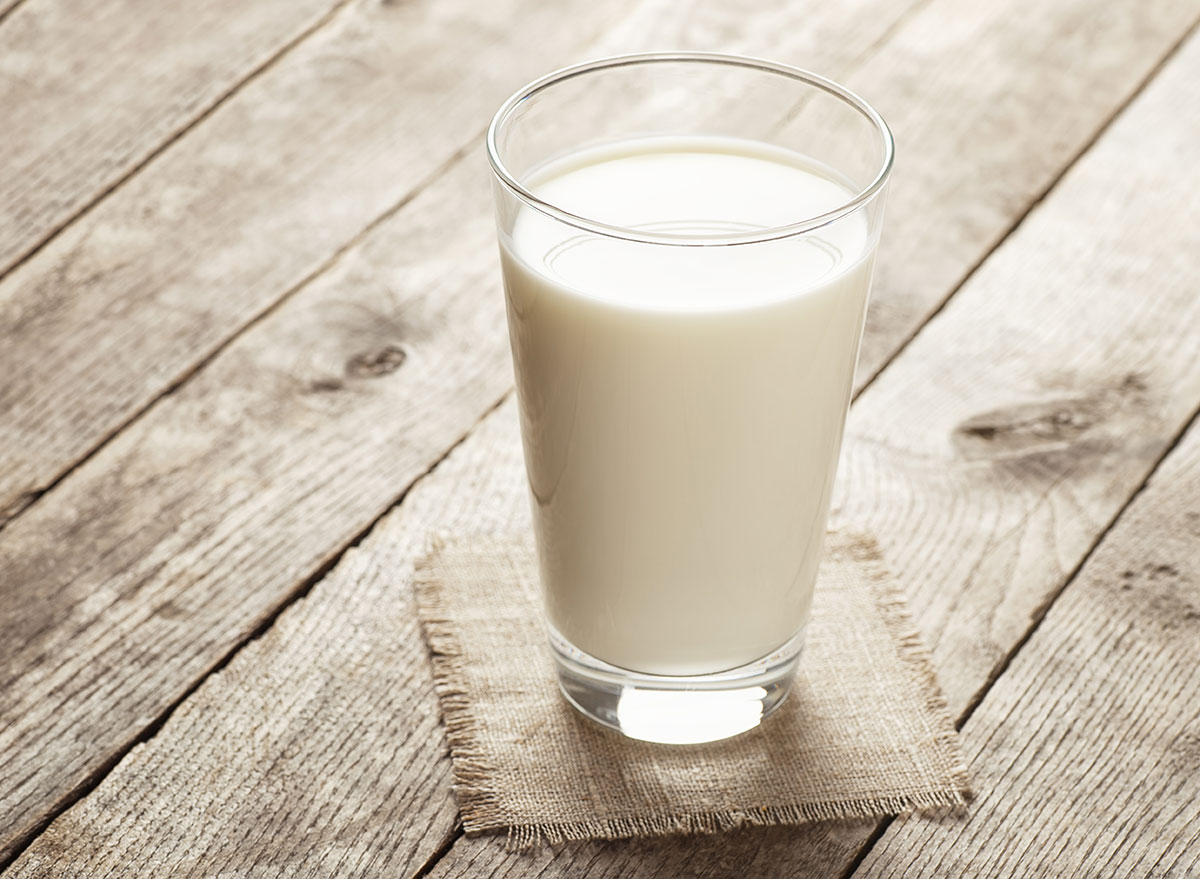9 Signs of Lactose Intolerance You Should Never Ignore

While a food allergy will cause obvious (often severe) symptoms, food intolerances often fly under the radar. When you have an intolerance, your body doesn’t know how to digest something—often a protein or enzyme—found in the food you’re eating. As a result, your body can only partially break it down. But instead of life-threatening symptoms, as would be the case with an allergy, an intolerance — like lactose intolerance — typically gives you mild to moderate ones, meaning you may not even realize you have a problem.
Lactose intolerance is probably the most common of all the food intolerances, affecting around 36 percent of Americans. If you have lactose intolerance, your intestines don’t produce enough of an enzyme called lactase that breaks down the sugar, or lactose, found in milk. This also applies to other dairy products like cheese, yogurt, and ice cream (Related: Lactose-Free Milk Solved My Bloating—It Could Work For You, Too)
Your symptoms can vary based on how much lactase you produce. If your levels are moderately low, you might have a dairy “threshold,” or a maximum amount of lactose you can consume before feeling sick. If your lactase levels are very low, however, you may not be able to tolerate much lactose at all.
It’s usually not dangerous or harmful to your health to eat a food you’re intolerant of, but it can definitely be uncomfortable. And consuming more lactose than you can digest will cause all kinds of unpleasant symptoms. If your daily serving of yogurt is accompanied by a daily bout of gastrointestinal distress, you may be lactose intolerant; here are nine key symptoms to look for. Read on, and for more on how to eat for better health, you won’t want to miss The Best Ways to Lose Belly Fat for Good, Say Doctors.
Bloating

Having trouble zipping up your jeans after eating dairy may not be because you overindulged; it could be that any amount of dairy would make you feel bloated and uncomfortable.
“If you have lactose intolerance, you may experience symptoms such as bloating or gas within 30 minutes to two hours after consuming a lactose-containing food or drink,” says Amy Gorin, MS, RDN, a registered dietitian in the New York City area and owner of Plant-Based Eats.
The timing is key for most people: if you feel bloated soon after eating dairy products, it could be an important clue. But if it happens even after eating non-dairy products, your intolerance is probably related to another type of food (like gluten) or simply the way you eat (too fast, maybe?).
Stomach cramps

One of the most common signs that you have a lactose intolerance is abdominal pain or cramping that follows consumption of dairy products. If you’re always complaining of a stomach ache after enjoying a bowl of ice cream or noshing on a cheese board, it could be because your stomach is not digesting lactose properly.
“The [undigested] lactose sits in the gut, where it is broken down by bacteria that can produce gas and cause uncomfortable bloating and cramping,” explains New Jersey-based registered dietitian Erin Palinski-Wade, RD, CDE, LDN author of Belly Fat Diet For Dummies.
Indigestion

If you’re predisposed to symptoms of acid reflux like heartburn and indigestion, having a lactose intolerance can make things worse. This isn’t the most common symptom of lactose intolerance, but it is an indicator that cutting back on dairy could help your symptoms. since dairy is high in fat and also known to relax the sphincter muscle of the esophagus (allowing more acid to travel upward), your reaction to dairy can really start to add up here if you’re sensitive to lactose at all.
So far, no studies have looked directly at the connection between lactose intolerance and indigestion, but several have studied the relationship between cow’s milk allergy and acid reflux. Caused by the protein found in cow’s milk, this allergy is common in young children and frequently goes hand-in-hand with symptoms of acid reflux; in a small 2012 study from The Journal of Pediatrics, parents who eliminated cow’s milk from their child’s diet reported a decrease in episodes of reflux.
Diarrhea

Do you find yourself running to the bathroom whenever you eat yogurt or drink a glass of milk? Do you need to carry anti-diarrheal tablets around with you “just in case” your fancy Italian restaurant dinner comes with a side of *ahem* unpleasantness?
If so, you could have lactose intolerance. Diarrhea is a warning sign that your stomach is not tolerating your dairy consumption, says Palinski-Wade, who adds that the amount of dairy you consume can play a role in the severity of your symptoms: “Generally, the more lactose consumed, the worse the symptoms, so a small amount of lactose may trigger gas or bloating whereas eating a large amount may lead to diarrhea.”
Gas

While gas can be the cause for some other symptoms on this list, like bloating and cramps, it can be bad enough to be a symptom in itself. Eating dairy when you have lactose intolerance can cause severe flatulence (which is not only uncomfortable but obviously fairly embarrassing, too).
“When you’re deficient in [lactase], the lactose in the foods you eat moves into the colon rather than being processed and absorbed within the body,” explains Gorin. “In the colon, the undigested lactose commingles with the normal bacteria and causes unpleasant symptoms such as gas.”
Nausea

There’s no specific reason for why eating dairy with a lactose intolerance causes nausea, but it’s a widely recognized symptom. Some experts speculate that it’s possibly because of the overgrowth of bacteria that occurs when your colon struggles to digest the lactase you’ve consumed.
A 2015 study published in Nutrients found a relationship between bacterial overgrowth in the small intestine and the prevalence of lactose intolerance in patients with irritable bowel syndrome (IBS). The authors note that this overgrowth is often to blame for the uncomfortable abdominal symptoms many people with a lactose intolerance experience.
Constipation

Another less-common but still possible symptom of lactose intolerance is constipation. While diarrhea is more likely, there are people who experience the total opposite problem with their bowel movements.
In an older study on lactose intolerance published in Alimentary Pharmacology and Therapeutics, researchers noted that improper digestion of lactose can disrupt something called gut motility, a.k.a. your colon’s ability to move food waste through your digestive system. Too fast and you end up with diarrhea…but too slow and you could end up with constipation, most likely because of the increased amounts of gas in your colon caused by the buildup of lactose.
Greasy or fatty stool

Maybe you don’t check the toilet bowl before flushing when you have a bowel movement, but you probably should: how your stool looks can tell you a lot about your overall health. And if you see greasy, orange-colored, or fatty deposits floating around in your stool after you go, that’s a sign that all is not well in your colon.
“When you see a greasy or fatty stool, this can be a sign of malabsorption within the body,” says Gorin. With a lactose intolerance, your body doesn’t digest the milk sugar; instead, it sits around in your colon (and blocks its absorption of other key nutrients).
Any time your stool doesn’t look the way it should (i.e. soft, smooth, and brownish in color) it’s good practice to give your doctor a call and see what they think might be the cause.
Eczema and other allergic symptoms

Finally, there is a chance that some other common allergic symptoms can be caused by lactose intolerance. Again, the research is older (and not thorough enough to be definitive), but some studies suggest a connection between a person’s inability to digest lactose and recurring allergy symptoms like eczema and sinus congestion.
For example, a Postgraduate Medical Journal review studied small groups of patients reporting itching, skin rashes, nasal allergy symptoms, and asthma and found that many of the patients ultimately diagnosed as lactose intolerant during the testing period reported symptoms like eczema, rhinitis, and sinusitis. If it isn’t dairy, your skin problems may also be linked to these 6 Worst-Ever Foods for Your Skin.








